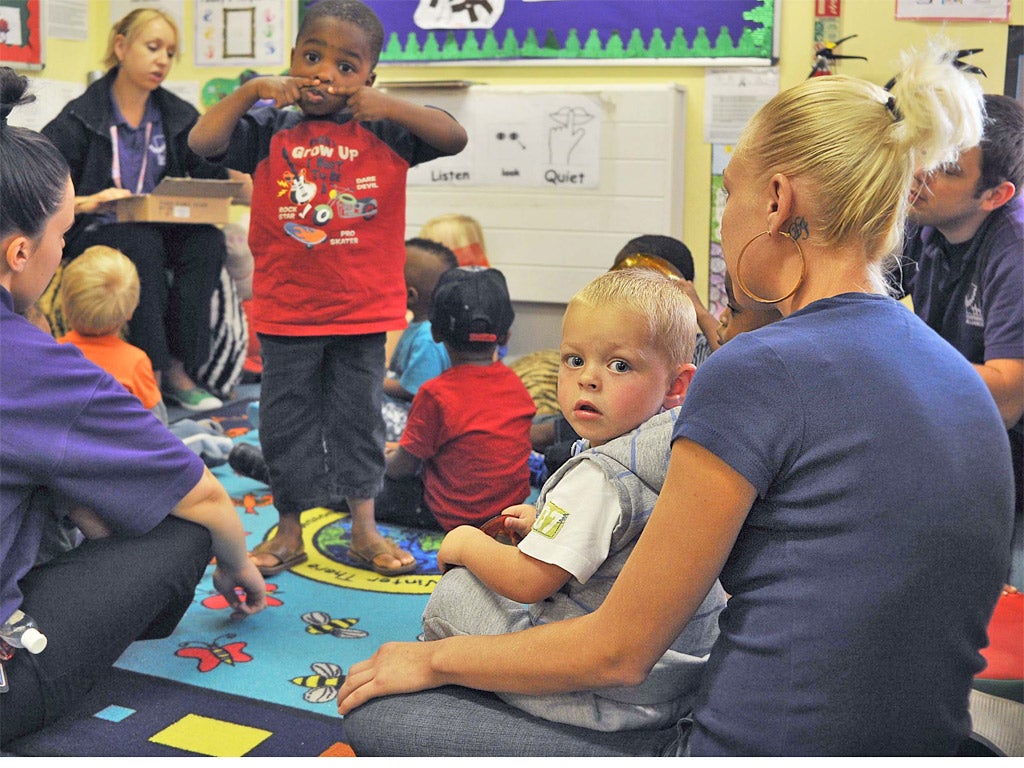Clegg's social mobility plan 'is failing youngest most in need'
Barnardo's warns that 'inexplicable' funding gap is affecting poorest pre-school children

The most vulnerable pre-school children are falling behind their peers even before they start school, due to an "inexplicable" gap in funding which casts doubt on the Government's flagship scheme to increase social mobility.
According to research by children's charity Barnardo's, Nick Clegg's much- vaunted scheme is at risk of failing because three- and four-year-olds from the poorest backgrounds have been omitted from the extra support.
The Deputy Prime Minister created extra funding to support children from the most deprived backgrounds, promising that the Government would intervene "at every stage of a child's education journey".
But the new research warns that while disadvantaged children are given additional funding from the ages of two to 18, this stops between the ages of three and the age at which they start school. This "inexplicable gap" in funding has the potential to undo all the early financial investment given to two-year-olds, it says.
Its report recommends that the Government could fill this gap – at no extra cost – by stretching the existing pupil premium so that it covers the age groups equally. This would help to close the attainment gap between poor children and their better-off classmates – a key factor in the Government's plan to improve social mobility.
Anne Marie Carrie, Barnardo's chief executive, said: "Investment in early years is crucial; it can help children advance, catch up, and overcome disadvantage. It's one of the most important and powerful factors in determining a child's future.
"The Government needs to put its money where its mouth is and ensure the most vulnerable three- and four-year-olds get the same additional support as schoolchildren."
From 2013, the 20 per cent most disadvantaged two-year-olds in the country will be eligible for 15 hours of free childcare per week for 38 weeks a year. This will be extended to the most disadvantaged 40 per cent in 2014 – costing £760m a year or approximately £2,923 per child.
All three- and four-year-olds are currently entitled to 15 hours per week of free early years education for 38 weeks a year, but no distinction is made between children from wealthy and poor backgrounds.
Once children start school they can qualify for the Government's pupil premium – currently worth £600 a year extra for their school. It was launched last year in an attempt to improve the education of the most disadvantaged young people.
The Government plans to increase the money available to £2.5 bn by 2014-15, leading to payments of £1,320 per child, according to Barnardo's.
Neil Leitch, chief executive of the Pre-school Learning Alliance, warned that early years provision was at breaking point due to underfunding.
He said: "Providers are under massive pressure. I struggle to see how we can deliver on the Government's agenda without adequate funding.
"They are asking more and more of us but there is not enough money. We would ask the new ministers responsible for childcare to seriously look at the level of funding."
Case study: 'Children need support as early as possible'
Josie Lait, manager of Northend Children's Centre in Slade Green, Kent, has been piloting free places for two-year-olds since 2009
"I think the scheme is enormously beneficial. It is important to identify children's needs as early as possible. It might sound a lot of extra money for two-year-olds but we have worked it out as about £6 an hour. But that isn't enough to cover another practitioner which is what we really need.
"I agree that there should be extra money for three- and four-year-olds. If you get extra support at two, all your needs will not necessarily have been met by the time you turn three. I think the funding should continue all the way until you start school.
"Sometimes funding for three- and four-year-olds doesn't even cover our costs. The Government needs to pay what we need to remain sustainable. If children have additional needs, that will put extra strain on the system."
Subscribe to Independent Premium to bookmark this article
Want to bookmark your favourite articles and stories to read or reference later? Start your Independent Premium subscription today.

Join our commenting forum
Join thought-provoking conversations, follow other Independent readers and see their replies